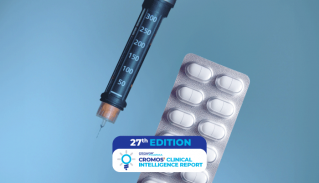
Clinical Research Focus. 8th Edition
How To Improve Patient Recruitment in Clinical Trials?
One of the single most important aspects of a successful clinical trial is patient recruitment. It is estimated that up to 50% of clinical trials miss patient recruitment deadlines, and up to 20% fail to recruit a single patient, costing pharmaceutical companies millions in the process.
The challenges posed by the processes involved in patient recruitment are multifaceted and difficult to overcome, which is why the clinical trials industry has been trying to find effective solutions to this problem for decades.
These issues do not have a single, comprehensive solution, but we hope that one of our articles on the topic, in which we discuss the factors that could contribute to low rates of patient recruitment, will provide you with some insightful and valuable tips that will benefit your next clinical program.
Read the full article here.
Treatment Outcome and Resistance Markers Identified in Triple Negative Breast Cancer (TNBC)
 The study conducted by the researchers at the Baylor College of Medicine, the Broad Institute of MIT, Harvard University, and clinicians at Washington University in St. Louis, has identified several biological markers that could potentially predict whether TNBC will be resistant to chemotherapy treatment.
The study conducted by the researchers at the Baylor College of Medicine, the Broad Institute of MIT, Harvard University, and clinicians at Washington University in St. Louis, has identified several biological markers that could potentially predict whether TNBC will be resistant to chemotherapy treatment.
The researchers were able to identify that the sensitivity to chemotherapy was marked by higher DNA repair signatures, interferon gamma signaling, and immune checkpoint components.
They achieved this by using an innovative method of analysis known as “microscaled proteogenomics,” which combines transcriptomics, genomics, and mass spectrometry (MS)-based proteomics to gain new information about cancer biology and the efficacy of treatment.
“The proteomic analysis of pretreatment biopsies uniquely revealed metabolic pathways that were associated with resistance to treatment, including fatty acid metabolism,” said Dr. Meenakshi Anurag, one of the authors of the study.
To learn more about this study and its broader implications, read the full article by following this link.
Antibody-Drug Conjugate Shrinks Brain Metastases in HER2+ Breast Cancer Patients
 The results obtained from the Phase II TUXEDO-1 study in patients with HER2-positive breast cancer and newly diagnosed untreated brain metastases or brain metastases that had progressed after receiving local therapy in the past indicate that an antibody-drug conjugate (ADC) Trastuzumab-Deruxtecan (T-Dxd) was able to reduce the size of metastases in 73.3% of the patients.
The results obtained from the Phase II TUXEDO-1 study in patients with HER2-positive breast cancer and newly diagnosed untreated brain metastases or brain metastases that had progressed after receiving local therapy in the past indicate that an antibody-drug conjugate (ADC) Trastuzumab-Deruxtecan (T-Dxd) was able to reduce the size of metastases in 73.3% of the patients.
Complete intracranial response with metastases being no longer visible on the brain scans was noted in two patients (13.3%), the partial intracranial response was observed in nine patients (60%), and three patients (20%) had stable disease.
One of the lead researchers working on this study, Dr. Matthias Preusser, stated: “Our findings open up entirely new avenues for clinical research and the treatment of brain metastases in breast cancer – and possibly other types of cancer as well.”
If you would like to learn more about the study, you can read the full article by following this link.
New Drug Candidate Developed to Treat Type 2 Diabetes
 By successfully linking the blood sugar-reducing effects of PPARɑ/ɣ dual-agonist tesaglitazar and GLP-1 receptor agonist (GLP-1RA), a team of researchers has developed a new drug candidate that exhibits the beneficial effects of both drugs while alleviating some of the undesirable effects of tesaglitazar.
By successfully linking the blood sugar-reducing effects of PPARɑ/ɣ dual-agonist tesaglitazar and GLP-1 receptor agonist (GLP-1RA), a team of researchers has developed a new drug candidate that exhibits the beneficial effects of both drugs while alleviating some of the undesirable effects of tesaglitazar.
The team of scientists managed to achieve this effect by biochemically by covalently linking tesaglitazar with GLP-1RA,, allowing the combined drug to only interact with the cells and tissues that have GLP-1 receptors.
One of the lead authors of the study, Dr. Krestin Stemmer, has stated that “The sugar metabolism of obese and diabetic male mice improved to a far greater extent compared with treatment using only the GLP-1RA or tesaglitazar alone—and with no damaging adverse effects to the liver or kidney”.
If you would like to learn more about this study, you can read the full article by following this link.
Roche Launches a Digital PCR System, A Powerful New Diagnostics Platform In The Fight Against Cancer And Other Diseases
 The multinational Diagnostics and Pharmaceuticals company Roche has announced the launch of its LightCyclerⓇ System, which is Roche’s first Digital Polymerase Chain Reaction (PCR) System, which has been designed to allow clinical researchers to detect and accurately quantify trace amounts of specific DNA and RNA mutations that would otherwise be extremely difficult or impossible to detect by using traditional PCR technologies.
The multinational Diagnostics and Pharmaceuticals company Roche has announced the launch of its LightCyclerⓇ System, which is Roche’s first Digital Polymerase Chain Reaction (PCR) System, which has been designed to allow clinical researchers to detect and accurately quantify trace amounts of specific DNA and RNA mutations that would otherwise be extremely difficult or impossible to detect by using traditional PCR technologies.
According to the announcement, this system will allow researchers to detect and diagnose certain infectious and oncology diseases at much earlier stages in their development, giving them and the physicians additional time to develop appropriate strategies for treatment.
You can read the full article here.
Moderna Files Patent Infringement Lawsuits Against Pfizer and Biontech Over Mrna Covid-19 Vaccines
 On August 26, 2022, Moderna announced in a press release that they intend to file patent infringement lawsuits against BioNTech and Pfizer.
On August 26, 2022, Moderna announced in a press release that they intend to file patent infringement lawsuits against BioNTech and Pfizer.
In the press release published on Moderna’s website, the CEO of Moderna, Stéphane Bancel, clarifies the reasons behind filing the lawsuits: “We are filing these lawsuits to protect the innovative mRNA technology platform that we pioneered, invested billions of dollars in creating, and patented during the decade preceding the COVID-19 pandemic”.
Pfizer responded to the allegations in a written statement to CNN, stating, “Pfizer/BioNTech has not yet fully reviewed the complaint, but we are surprised by the litigation given the Pfizer/BioNTech COVID-19 Vaccine was based on BioNTech’s proprietary mRNA technology and developed by both BioNTech and Pfizer. We remain confident in our intellectual property supporting the Pfizer/BioNTech vaccine and will vigorously defend against the allegations of the lawsuit”.
You can read the full article here.
If you wish to see the complete statement issued by Moderna regarding this situation, you can find it here.
Key Blood Clotting Protein Could Be ‘Warning Light’ For COVID-19 Cases
 A team of scientists at the University of Aberdeen claims to have identified a protein that could serve as an early indicator for the emergence of severe COVID-19.
A team of scientists at the University of Aberdeen claims to have identified a protein that could serve as an early indicator for the emergence of severe COVID-19.
The researchers observed that the levels of the protein called “plasminogen activator inhibitor 1” (PAI-1) were significantly higher in the patients infected with COVID-19 compared to the patients with non-COVID-19 respiratory infections and compared to the patients in the control group who hadn’t been infected with any type of respiratory infection.
The researchers argue that since PAI-1 inhibits the breakdown of fibrin in the body, the high levels of PAI-1 observed in patients infected with COVID-19, prevent fibrin removal from the lungs, thus contributing to the emergence of pulmonary complications and thrombosis.
You can read the full article here.
IRB Submission Should Be a Smooth Sailing
 To receive marketing authorization for a newly developed drug, it must first be thoroughly investigated in clinical trials with human subjects.
To receive marketing authorization for a newly developed drug, it must first be thoroughly investigated in clinical trials with human subjects.
However, the process of obtaining authorization from relevant regulatory authorities to conduct clinical trials involving human subjects is relatively complicated.
To successfully initiate a clinical trial the first regulatory hurdle that one must overcome is obtaining authorization from an Institutional Review Board (IRB).
Our article provides information about the role of IRBs and offers the reader some valuable insights that can help them ensure that their IRB submission gets approved in a timely manner.
Read the full article here.






























